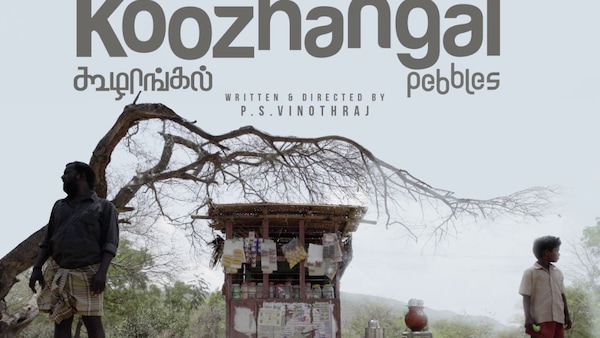Koozhangal Review: PS Vinothraj's film is a beautiful and bare take on rage and misery, a must-watch
The raw and rustic film set in an arid backdrop, aptly captures an agonizing relationship between an abusive father and his son as they traverse a tumultuous journey through miles of parched land.

Last Updated: 05.03 PM, Oct 28, 2023
Story: A school-going boy travels with his alcoholic father to bring his mother and sister back home
Review: It's not often that one witnesses such raw and intense format of storytelling with such chiselled finesse. Debutant director PS Vinothraj has hit the ball straight out of the park with Koozhangal (Pebbles).
The film, which was India's official entry to the Academy Awards in 2022, is all walk and less talk, literally! The lead characters of the film, whose names are revealed only toward the fag end as Velu (Chella Pandi) and Ganapathy (Karuthadaiyaan with an interesting gait) walk like there is no tomorrow and we journey along with them indvertently. It is through their eyes that we see the film. The dialogues in the film are bare minimum, but their expressions are enough to read their minds.
Koozhangal is set in a drought-hit arid land in Tamil Nadu. And just like the bone- dry land, the villagers, too, have resigned to their fate. Every character in the one hour and 15 minute film has something to tell, even though some of them do not utter a single dialogue. Be it the old woman who pays for the three pots of water in the mini bus, a young woman and her baby daughter who are irked by the noisy fight in the bus (who seems to be a victim of domestic violence), the bunch of women going to the sandhai or the teacher who gives Velu, a lift on her motorcycle or the family from a marginalised community feeding on rats, their presence is beautifully weaved into the story.
Vinothraj tells us very little about his protagonists. All we know is that Ganapathy is boorish, alcoholic, a chain smoker and that he beats his wife very often. Velu's growing stack of pebbles is testimony to that. Tired of domestic violence, his wife Shanthi (we never see her) leaves the house along with their daughter to her mother's home.
Ganapathy is now on a mission to bring her back home. However, it's not with the right intention. For Ganapathy, his wife is nothing more than a cook and maid. He keeps referring to her using abusive words. Velu, who clearly cannot get along with his father, uninterestingly accompanies him in the journey.
The tension between the father and the son is palpable right from their first interaction when Ganapathy asks Velu, " Do you like your father or mother more?" and the latter doesn't respond. When they wait for the bus to arrive, both of them look in the opposite direction and that frame will be etched in our memory for a long time.
To get back at his father in his own way, he tears the wad of currency notes and makes his father walk all the way back home under the scorching sun, uses a shard of glass to irritate him, and refuses to give a matchbox to light his father's beedi.
Ganapathy, too, doesn't leave any stone unturned to beat up and bully his son. When Velu gets a lift from his school teacher, an irritated Ganapathy first walks toward the opposite direction, but returns and ends up injuring his toe on the way back. And when he sees Velu resting under a tree, it drives him bananas.
The film is a rudimentary but bold take on toxic masculinity, domestic violence, abusive parenting and poverty, all rolled into one. And the lead characters deliver a stellar performance with their expressions. As Velu puts a pebble in his mouth and later places it on his pile at home, we realise that this was been the drill for quite some time.Even amid all the misery, Velu proves that there is hope after all, when he slows down his pace after seeing an aircraft, gets a toy for his sister and brings home a puppy. The other child Ganga, too, displays hope as she offers to share her food and plays with nature.
The cinematographers of the film, Vignesh Kumulai and Jeya Parthipan, deserve a special mention as the camera tells a story on its own. Their lens strips down every single detail of the village to the skin and bones. The landscape and frames are a metaphor in themselves, be it the dried vegetation, scorching heat and rocky terrain. The unrelenting sun beating down on Ganapathy and Velu in its entire fiery orange glow, itself becomes a crucial part of the film, as they traverse through miles of dessicated land, bare feet.
The last frame where the women are lined up with their empty pots waiting to get their fill of water can leave every viewer unsettled. So, is the editing by Ganesh Siva, who has packaged the film with some fantastic frames and cuts. The background score by Yuvan Shankar Raja perfectly complements the goings-on on the screen. It's not often that everything comes together so well.
Also Read: Exclusive! Koozhangal is based on events that happened to my sister: director P.S. Vinoth Raj
With Koozhangal, PS Vinothraj has arrived and how. The film is truly a feather in the hat for the debutant and shows that there is beauty in simplicity and in this case, misery!
Verdict: PS Vinothraj's Koozhangal is a simmering and captivating tale of anger, rage and misery that leaves you unsettled. This film is a must-watch!

 Premium
Premium